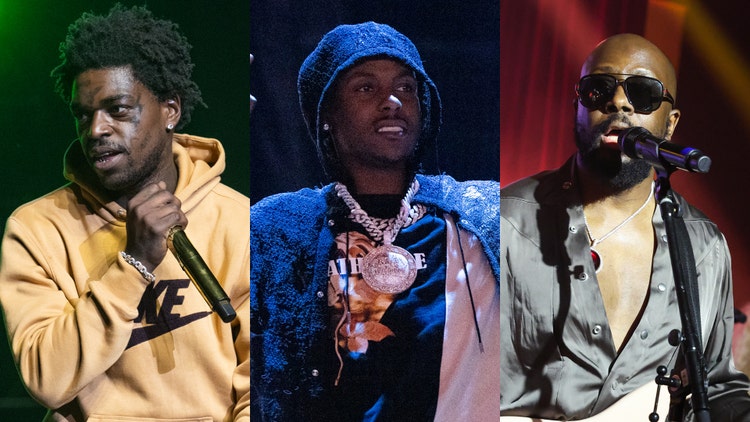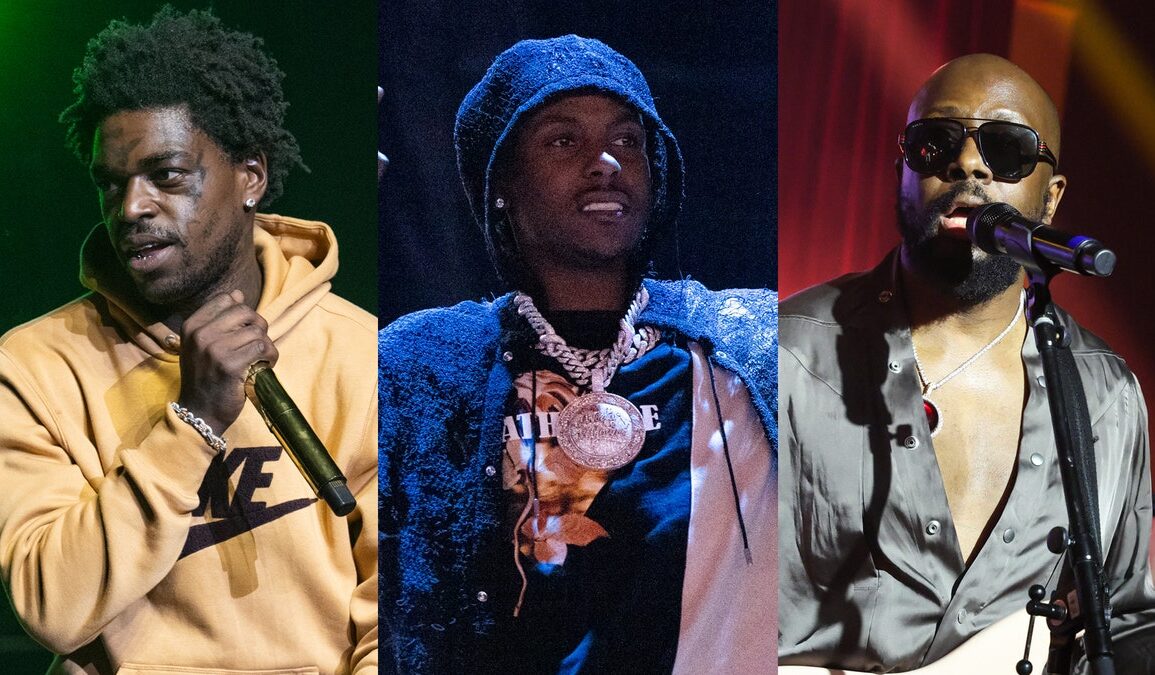Image

Image Credit
Prince Williams/Contributor via Getty Images, Scott Dudelson/Contributor via Getty Images and Alexander Tamargo/Contributor via Getty Images
Image Alt
Kodak Black, Rich The Kid and Wyclef Jean
Image Size
landscape-medium
Image Position
center
Hip Hop has always been a powerful vehicle for diaspora expression, and Haitian culture has made its mark in unforgettable ways. From rap Kreyòl on the streets of Port-au-Prince to trap anthems from Broward County, Haitian and Haitian-American rappers have helped shape the genre’s evolution, voice and resistance. Their stories often carry the weight of immigration, identity and revolution — values deeply rooted in the Caribbean nation’s own history. Haitian Flag Day, celebrated every May 18, is a day of national pride that traces back to 1803, when the iconic red and blue flag became a symbol of Black liberation and unity. That same spirit shows up in the verses, cadences and careers of the artists below.
This list honors the lyricists who represent Haiti loud and proud, whether through Creole slang in a freestyle or by spotlighting their heritage in interviews and activism. From pioneers like Kangol Kid and Pras to subsequent forces like Kodak Black, Mach-Hommy and Baky Popile, these emcees embody the grit, resilience and global impact of Haitian culture. And while these individuals aren’t rappers, Haitian-Canadian producer KAYTRANADA and veteran music executive Jacques “Haitian Jack” Agnant deserve special mention for their massive contributions. But this one is strictly for the spitters — those putting in lyrical work on behalf of the flag.
1. Wyclef Jean
Arguably the most internationally recognized Haitian artist in Hip Hop, Wyclef Jean turned his upbringing in Croix-des-Bouquets, Brooklyn and New Jersey into a global sound. As a member of the Fugees, he helped define the culture with albums like The Score, and his solo projects (The Carnival, Masquerade and many others) fused rap with kompa, reggae and soul. Wyclef often delivers his rhymes in Creole, and his lyrics touch on politics, migration and the Haitian experience. He’s also long been active in Haitian development through nonprofit work, showing how art and advocacy go hand in hand.
2. Pras
Alongside Wyclef (and, if only by proxy, Lauryn Hill), the Fugees’ Pras Michel played a key role in elevating Haiti’s presence in Hip Hop. Born in Brooklyn to Haitian parents, Pras delivered laid-back flows and contributed to the group’s legendary chemistry. His solo hit “Ghetto Supastar” became a global smash, and he’s continued to be active in film and humanitarian efforts. Despite his legal controversies, Pras’ legacy as an early Haitian-American voice in rap remains essential to the culture.
3. Mach-Hommy
Mach-Hommy is one of Hip Hop’s most lyrically elite — and elusive — voices. Hailing from Newark, New Jersey with roots in Port-au-Prince, the emcee with a face hidden behind a Haitian flag combines dense, often bilingual bars with diverse production. His albums Haitian Body Odor, Pray for Haiti and #RICHAXXHAITIAN are steeped in historical pride and community uplift, with a portion of proceeds going toward educational initiatives in Haiti. Rarely doing interviews or public appearances, Mach is a cult hero whose work quietly but powerfully advances the Haitian rap narrative.
4. Kodak Black
Kodak Black is without question one of the most known as far as Haitian-American rappers are concerned. A product of Pompano Beach, Florida, his gritty, melodic trap style catapulted him into the mainstream with hits like “No Flockin,” “Tunnel Vision,” and “Super Gremlin.” Kodak frequently references his Haitian upbringing, celebrating his heritage even as his personal life draws media scrutiny. His visibility as a successful rapper of Haitian descent carries weight, especially among younger fans.
5. Kangol Kid
As a member of the groundbreaking group UTFO, Kangol Kid was one of the first Haitian-American rappers to gain widespread recognition. Born Shaun Shiller Fequiere in Brooklyn to Haitian parents, Kangol was a true pioneer who helped define the early B-boy era with hits like “Roxanne, Roxanne.” He was also the first rapper to be endorsed by Kangol, the hat brand that became a streetwear staple. Before his unfortunate death, Kangol Kid remained a vocal representative of Haitian excellence in Hip Hop’s foundational years.
6. Flipp Dinero
Flipp Dinero, born Christopher Saint Victor, grew up in Brooklyn with strong Haitian roots. He exploded onto the scene with the melodic hit “Leave Me Alone,” which went viral thanks to an endorsement from Odell Beckham Jr. and co-signs from the likes of DJ Khaled. Blending melodies with street-smart bars, Flipp took the unique approach of bridging internet virality with cultural pride.
7. Fantom
Fantom was a founding member of Haiti’s Barikad Crew and a legend in the rap Kreyòl movement. His rugged vocals and socially conscious rhymes made him a voice for the people, especially in Port-au-Prince neighborhoods where rap served as rebellion. Even after surviving a major accident during Haiti’s Carnival, Fantom remained active in the music scene and continued to use his platform to speak truth to power.
8. Jackboy
Originally born in Haiti, Jackboy, born Pierre Delince, is another Broward County native who’s kept his national close to his chest while navigating the rap game. A longtime affiliate of Kodak Black and the Sniper Gang crew, Jackboy eventually carved out his own lane with tracks like “Pressure” and “Where I’m From.” His music often reflects on struggle, loyalty and immigrant identity, serving as both street diary and cultural affirmation.
9. Jay Burna
Jay Burna, real name Jude Francois, is a Fort Lauderdale-based rapper and entrepreneur who uses his platform to uplift his Haitian roots. With songs like “Ready” and “Change the Game,” Burna mixes motivational lyricism with smooth production. He’s collaborated with icons like T.I. and Trina, and often champions independence through his label, Black Congress Music Group, making him a torchbearer for self-made success in the Haitian-American community.
10. Rich The Kid
This might be a surprise to some. Rich the Kid was born in Queens to Haitian parents before moving to Atlanta, where he immersed himself in the city’s booming rap scene (sometimes, you can even catch him speaking in Haitian Creole). Known for hits like “Plug Walk” and “New Freezer,” Rich the Kid brings an energetic flow and flamboyant style to the trap landscape. Despite his flashy image, he’s spoken often about the discipline and hustle he learned from his Haitian upbringing.
11. SNOT
Edy Edouard, better known as SNOT, is part of a wave of alternative rap voices. With Haitian and Dominican roots, he’s built a cult following thanks to songs like “Gosha” and “Mean,” which showcase his deadpan delivery and emo-influenced aesthetic. He often keeps a low profile, but in interviews, he credits his family background for keeping him grounded as his career accelerates.
12. Trapland Pat
Another standout from South Florida, Trapland Pat brings charisma and Creole influence to every track. Known for his lively flows and animated videos, songs like “Big Business” and “Thru Da Door” highlight his Southern flavor with a Haitian twist. He often weaves references to his upbringing and heritage into his music, helping further normalize Kreyòl pride in mainstream rap.
13. Izolan
One of Haiti’s most consistent and respected rappers, Izolan began as a member of Barikad Crew before launching a successful solo career. Known for his impassioned performances and unfiltered storytelling, Izolan addresses political turmoil, economic inequality and national pride — in his native tongue — head-on. He’s considered a staple in Haitian Hip Hop and a vocal critic of societal injustice.
14. Baky Popile
Baky Popile rose through Haiti’s underground rap circuit with a blend of bravado, street realism and poignant messaging. His music, which often includes elements from konpa, reggae and zouk, frequently critiques inequality and calls for youth empowerment, while also delivering crowd-ready anthems. Baky has become one of the most streamed and discussed rappers in Haiti, maintaining both commercial appeal and political bite.
15. Won-G
Port-au-Prince-born, Brooklyn-raised Wondge Bruny, aka Won-G, has the unique distinction of being one of the earliest Haitian-American rappers to find commercial success in the U.S. during the genre’s golden age and turn of the century. Tracks like “Nothing’s Wrong” and “Rich Together” highlight his smooth West Coast-influenced delivery. Though he’s now more involved in business, Won-G remains an important figure in the story of Haitian representation in Hip Hop.
This post was originally published on this site be sure to check out more of their content.







